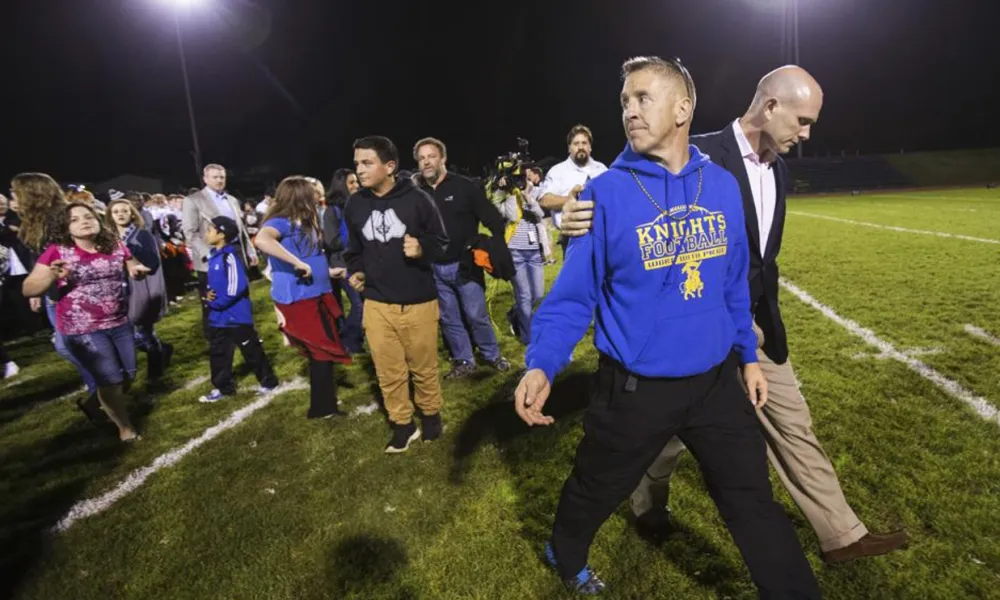Christianity Today
Supreme Court rules in favor of football coach who lost his job for praying at 50-yard line after games

The Supreme Court on Monday ruled in favor of a high school football coach who lost his job for praying at the 50-yard line after games.
In a 6–3 decision, the Court determined that the First Amendment guarantees his right to lead a voluntary postgame prayer on the field with his players and that the school district cannot punish him for it.
In 2015, Joseph Kennedy, a former assistant coach at Bremerton High School in Washington state, was placed on administrative leave by the school district after he refused the school’s request that he move to a private location to pray. Kennedy’s lawyers argued in April that his public prayers are protected under the Free Speech and Free Exercise clauses in the First Amendment of the U.S. Constitution.
According to Yahoo News, the school district didn’t fire Kennedy, rather, they gave him a poor performance evaluation. Because of it, Kennedy didn’t attempt to renew his contract after the football season finished.
The school district said it suspended him to avoid violating the Establishment Clause of the Constitution by appearing to endorse a particular faith. While Kennedy has said he never asked or pressured anyone else to pray with him, the school district argued that, as coach, Kennedy’s players looked up to him and felt coerced into joining.
The Supreme Court ultimately determined that no student was coerced or ever said they felt coerced to participate in these postgame prayers.
“Both the Free Exercise and Free Speech Clauses of the First Amendment protect expressions like Mr. Kennedy’s,” Justice Neil Gorsuch wrote in the majority opinion. “Nor does a proper understanding of the Amendment’s Establishment Clause require the government to single out private religious speech for special disfavor. The Constitution and the best of our traditions counsel mutual respect and tolerance, not censorship and suppression, for religious and nonreligious views alike.”
The court’s three liberal members – Justices Stephen Breyer, Sonia Sotomayor and Elena Kagan – dissented.
“This decision does a disservice to schools and the young citizens they serve, as well as to our Nation’s longstanding commitment to the separation of church and state,” Sotomayor wrote in their dissent. “This Court consistently has recognized that school officials leading prayer is constitutionally impermissible. Official-led prayer strikes at the core of our constitutional protections for the religious liberty of students and their parents.”
Sotomayor rejected Gorsuch’s description that Kennedy “offered his prayers quietly while his students were otherwise occupied.”
Sotomayor writes: “To the degree the Court portrays petitioner Joseph Kennedy’s prayers as private and quiet, it misconstrues the facts. The record reveals that Kennedy had a longstanding practice of conducting demonstrative prayers on the 50-yard line of the football field. Kennedy consistently invited others to join his prayers and for years led student athletes in prayer at the same time and location. The Court ignores this history.”
Terry A. Hurlbut has been a student of politics, philosophy, and science for more than 35 years. He is a graduate of Yale College and has served as a physician-level laboratory administrator in a 250-bed community hospital. He also is a serious student of the Bible, is conversant in its two primary original languages, and has followed the creation-science movement closely since 1993.
-

 Accountability3 days ago
Accountability3 days agoWaste of the Day: Principal Bought Lobster with School Funds
-

 Civilization21 hours ago
Civilization21 hours agoWhy Europe Shouldn’t Be Upset at Trump’s Venezuelan Actions
-

 Executive2 days ago
Executive2 days agoHow Relaxed COVID-Era Rules Fueled Minnesota’s Biggest Scam
-

 Constitution3 days ago
Constitution3 days agoTrump, Canada, and the Constitutional Problem Beneath the Bridge
-

 Christianity Today21 hours ago
Christianity Today21 hours agoSurprising Revival: Gen Z Men & Highly Educated Lead Return to Religion
-

 Civilization2 days ago
Civilization2 days agoThe End of Purple States and Competitive Districts
-

 Executive1 day ago
Executive1 day agoWaste of the Day: Can You Hear Me Now?
-

 Civilization5 days ago
Civilization5 days agoThe Conundrum of President Donald J. Trump


